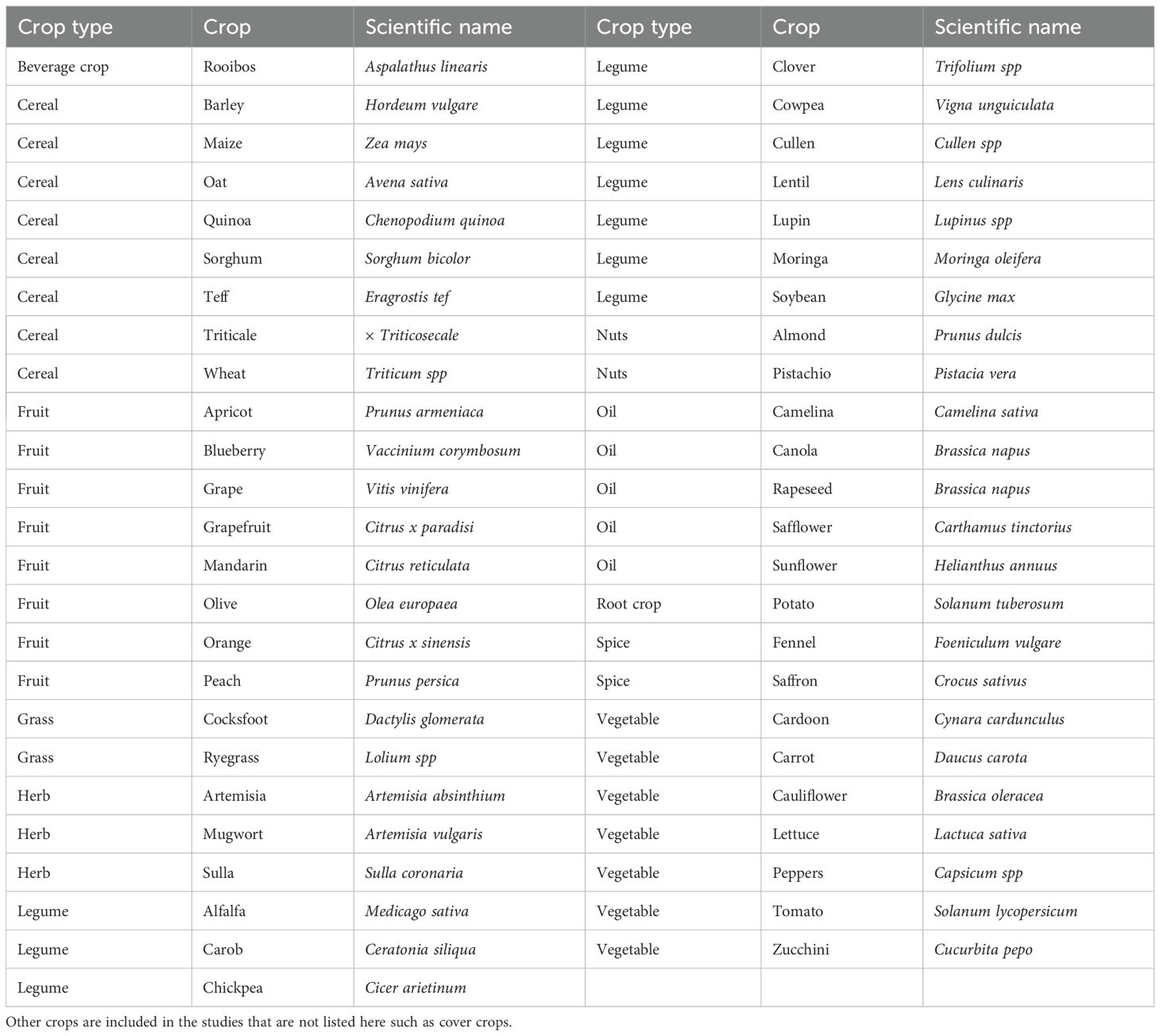- 1Faculty of AgriSciences, Stellenbosch University, Stellenbosch, South Africa
- 2Department of Agronomy, Stellenbosch University, Stellenbosch, South Africa
- 3Department of Agriculture, Western Cape Government, Elsenburg, South Africa
- 4Department of Horticultural Science, Stellenbosch University, Stellenbosch, South Africa
Agriculture systems require evidence-based management approaches to minimize impacts from climate change and to minimize greenhouse gas emissions. This is critical in global regions with a Mediterranean-type climate where the impacts are expected to intensify greater than the global average, thus threatening crop yields. A significant knowledge gap exists regarding the agronomic interventions that are suitable for climate-smart agriculture considering their net effects on climate adaptation and mitigation. This study seeks to fill this gap in the context of a Mediterranean-type climate. A systematic map study was conducted on peer-reviewed research focusing on climate change relevant agronomic interventions in crop production systems. The aim was to assess the extent of the research pertaining to climate mitigation and/or climate adaptation and the readiness to inform evidence-based climate-smart agriculture policy. A total of 722 articles were identified from database searches, 648 articles were screened for relevance, and 158 articles were selected for further analysis. Information was extracted on geographic location of the research, timing of the research, type of climate change outcome researched, interventions studied, and crops studied. The study found that the knowledge base was significantly inadequate of what can be implemented to adapt and/or mitigation climate change and the net climate effects of interventions. 27 interventions were studied across 55 unique crops since 1996, mostly in Spain and Italy. More studies were relevant to climate adaptation (62%) than mitigation (22.5%). 15.2% of studies considered both adaptation and mitigation together and only 1 of 158 considered impacts on yield, adaptation, net mitigation. This study concluded that a larger evidence base is needed to inform policy on which crop management interventions are suitable to maximize positive impacts of both climate mitigation and adaptation together, with positive or acceptable yield outcomes. It is also recommended that further research into interventions should include yield and product quality, as well as economic and social benefits and trade-offs.
Introduction
The Mediterranean-type climate regions of the world have seasonal cycles of hot and dry summers and temperate, wet winters (Roberts et al., 2001). They are warming faster than the global average, and they are projected to be drier in the future (Urdiales-Flores et al., 2023). The Earth has already warmed about 1.1°C since pre-industrial levels, and global warming will increase if greenhouse gas (GHG) emissions are continuously released into the atmosphere from human activities (IPCC, 2023). Mediterranean-type climate regions cover five continents in the subtropics to mid latitudes and on the western edge of continents, sharing similar planetary dynamics (Seager et al., 2019). The regions include the Western Cape province of South Africa, South and Western Australia, the west coast of North America extending from northern Mexico to Washington State, central Chile, and the Mediterranean basin (Seager et al., 2019).
Food security is already a core issue (FAO et al., 2024; United Nations, 2015) and it is likely to be exacerbated as global warming impacts crop yields (IPCC, 2023). Mediterranean-type climates typically support the cultivation of cereals, fruits, and vegetables (Mrabet et al., 2020). These crops include wheat (Triticum aestivum), maize (Zea mays), barley (Hordeum vulgare), rice (Oryza sativa), canola (Brassica napus), potatoes (Solanum tuberosum), tomatoes (Solanum lycopersicum), olives (Olea europeae), grapes (Vitis vinifera), dates (Phoenix dactylifera) and almonds (Prunus dulcis), amongst others. Climate projections suggest these regions will have drier weather (Lionello et al., 2014; Seager et al., 2019) and greater uncertainty of precipitation (Lionello et al., 2014). This will reduce the growing season and quality of the crops, thus leading to reduced marketable yield (Mrabet et al., 2020). Increasing resilience to climate change is needed, requiring different crop management approaches and technologies.
In addition to enhancing climate resilience, crop systems are also under pressure to reduce greenhouse gases (GHGs), or mitigate climate change. Changing management practices of crop production in the Mediterranean biome can reduce approximately 261 Teragrams carbon dioxide equivalent (CO2 eq) per year (Aguilera et al., 2021). Policy pressure is intensifying to achieve the 1.5 degree target set by the 2015 Paris Agreement under the United Nations Framework Convention on Climate Change (UNFCCC) (2015). All countries that include a Mediterranean-type climate within their country have signed1 the Paris Agreement (United Nations, 2025).
The decisions to shift agriculture to enhance food security are a political one considering the potentially significant trade-offs (Vermeulen et al., 2012). Tradeoffs may include mitigating GHGs versus optimising yield or increasing operational inputs to enhance climate resilience versus reducing profits. An evidence-based approach to identify agronomic interventions and their net effects on climate change mitigation, adaptation and yield is needed. Research is needed to consider specific crops, geographies and other specific contexts to make the findings applicable. This evidence base should be applied to achieve policy goals, such as achieving climate-smart agriculture. The scientific community has a role to inform farmers and decision-makers on the interventions or strategies to achieve a climate-smart outcome (Beddington et al., 2012).
In a Mediterranean climate context, meta-analyses and reviews have been conducted to assess the impact of specific interventions within the area of climate change. Reviews were conducted on cover crops (Shackelford et al., 2019; Ziche et al., 2024) organic fertilizers (Aguilera et al., 2013b) conservation agriculture (Tadiello et al., 2023), agroecology (Aguilera et al., 2020) and organic management (Aguilera et al., 2013a). These studies have often been limited to a type of crop, a particular intervention, such as cover cropping, an aspect of climate mitigation or adaptation, such as carbon sequestration. A significant gap exists to understand what agronomic approaches are suitable for climate-smart agriculture considering the net effect on climate adaptation and mitigation are. To our knowledge, a review of agronomic interventions that consider both climate change mitigation and adaptation in regions with a Mediterranean-type climate has not been conducted. This study seeks to contribute to addressing this gap to guide future researchers and to inform policy makers of the knowledge available for evidence-based policy.
The aim of this study is to investigate the peer-reviewed research on climate-smart agronomic interventions in regions with a Mediterranean-type climate, considering both climate mitigation and adaptation. The specific objectives of the study are to a.) map the existing literature, including the interventions assessed, and b.) to analyze the state of the research to inform climate policy.
Materials and methods
A systematic mapping study was conducted to generate a database of published articles describing research on climate adaptation and climate mitigation interventions in cropland agriculture in a Mediterranean-type climate. A systematic map allows for the collating of evidence that may not be synthesized together as in a meta-analysis, but it is useful to answer broader research questions that are relevant to policymakers regarding, for example, what is the state of research and what interventions have been studied? (James et al., 2016). Bibliometric analysis techniques were applied to analyze literature to map the research field. Bibliometric analysis allows for assessing the state of the research space to unpack the structure and dynamics of a research topic (Donthu et al., 2021). The reporting of this systematic review was guided by the standards of the Preferred Reporting Items for Systematic Review and Meta-Analysis (PRISMA) Statement and the PRISMA Extension for Scoping Reviews (PRISMA-ScR) (Page et al., 2021; Tricco et al., 2018).
A literature search was conducted in March 2025 using Web of Science and Scopus databases. These databases were considered sufficient for this research that considers peer-reviewed literature, excludes grey literature but also reduces duplication. The search terms used were deemed appropriate for a policy practitioner or researcher interested in locating studies on climate change mitigation and adaptation in crop production in a Mediterranean-type climate. The following search phrase used was: (agriculture OR farm) AND crop AND Mediterranean AND (climate change OR climate) AND (mitigate OR adapt OR reduce OR resilient OR greenhouse gas OR emissions). This search may exclude non-English studies. The scope of the search included the title, abstract and keywords and no limits were set on the publication date. One researcher conducted the review process.
Screening and coding of studies
This analysis was limited to peer-reviewed articles, including review and data papers. All crop types were considered, including perennial and annual crops and woody or non-woody crops. The researchers did not want to limit the findings based on certain crop types since learnings on crop management may be applied across different crops. Consideration was made of both irrigated and rainfed conditions since both are applied in Mediterranean-type climates. The included agronomic studies consider a variety of research methods applicable to field crops at the commercial scale, including on-farm experimentation, pot-trials and in-vitro screening. Meta-analyses of such studies were also included. Where existing, aspects of studies that include ground-truthing or calibration of models, such as for life cycle analysis, were included.
The studies excluded conference papers, book chapters, studies within a controlled climatic environment and not applicable to field-based crop production, such as studies with the aim of informing greenhouse production practices, and research that was outside of the scope of field-based crop production such as assessments of land use systems. Simulation studies including life cycle analysis and other modelling exercises were also excluded since these use certain generalized input data such as emissions factors to quantify GHGs or soil organic carbon (e.g. default GHG emissions factors from the Intergovernmental Panel on Climate Change). There is no scientific consensus on specific emissions factors for the Mediterranean-type climate.
Data coding was conducted on the studies included in the review, and the metadata was extracted and compiled into a database (Supplementary Table 1). The information extracted from the studies includes general information such as the year of publication, the year of the trial being conducted, the objective of the study and the treatments assessed. Climate change-relevant information included whether the respective author framed the article in terms of climate change, if the article was relevant to climate mitigation and/or climate adaptation, the climate interventions studied, and the aspect of climate mitigation (including GHG, carbon sequestration) or climate adaptation outcome relevant. The climate adaptation outcomes are defined in Supplementary Table 2. In instances where studies assessed combinations of interventions they were counted as instances studied rather than per study or per combination to give them equal weighting in the results. The interventions considered in this study are defined in Supplementary Table 3.
The analysis was conducted in R software (R Core Team, 2021). The R scripts used in the analysis can be found in the GitHub repository:
Results and discussion
The outcome of the systematic review process, including the articles identified, screened and included in the systematic mapping database, is presented in the PRISMA flowchart (Figure 1). This search retrieved 722 articles. An initial screening of abstracts and titles to remove duplicates and provide relevance to this review’s objective resulted in 198 articles for further screening. After the full article screening, the final set of articles from the literature included 158 articles.
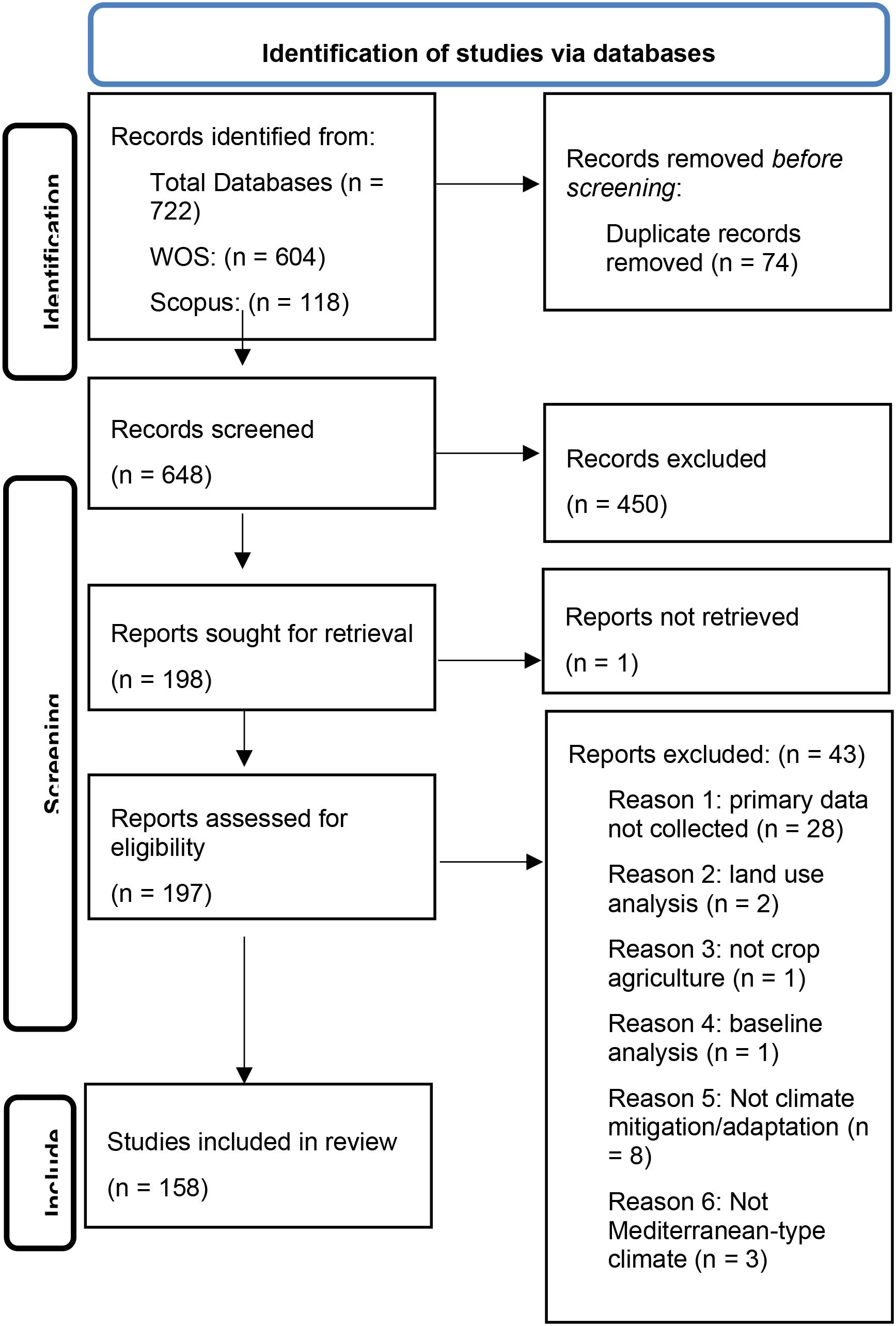
Figure 1. Flow chart for the systematic map, showing the number of records kept at each stage of the review process.
Meta-data of the systematic map
Year of research and publication
The earliest date of publication was 1998, and the earliest date of research conducted was 1996 (Figure 2). The earliest studies were associated with climate resilience, while studies on climate mitigation began to be published in 2007. There has been a general increase in publications between 1998 and 2024 (R2 = 0.716; p<.001), with the highest number of publications in 2024 (n=26), the last complete year of data collection. The median number of publications occurred in 2012, 2014 and 2016 (n=4) and the publications cumulated to 50% in 2023 (n=81). The highest growth of publications was observed between 2019 and 2024. In this period, 66% of the total articles were published. An increasing trajectory in the output of published articles was also found in other studies such as reviews of: global research on climate change and agriculture (Li et al., 2024; Pius Awhari et al., 2024), conservation agriculture and climate mitigation (Román-Vázquez et al., 2025), climate change and agriculture and forestry (Aleixandre-Benavent et al. (2017), and GHG flux of agriculture management practices in a temperate climate (Collins et al., 2022).
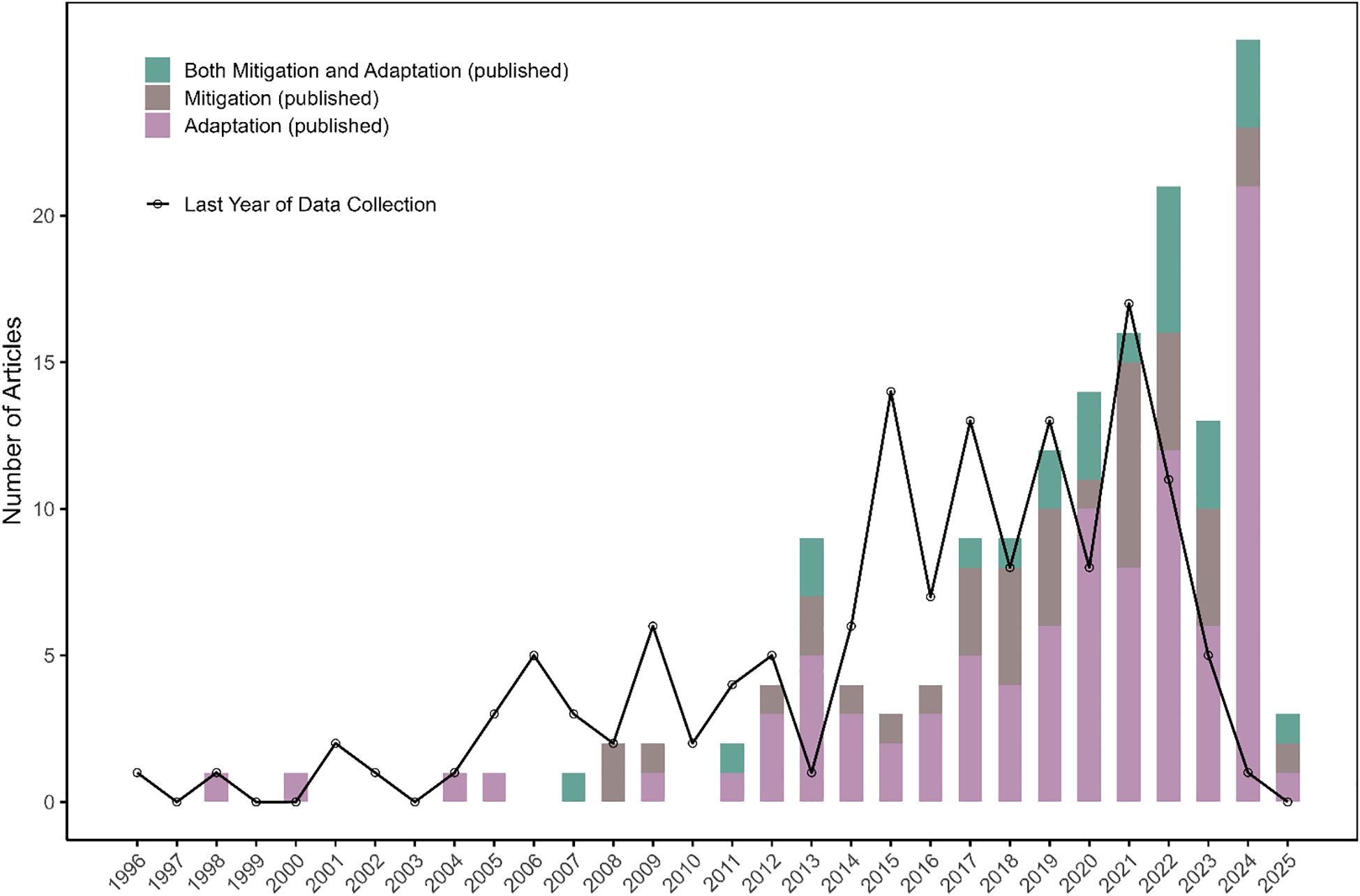
Figure 2. Research articles plotted against time, including years of publication and years of research. Many studies were conducted over multiple years, and in this case, the final year of study was used. Articles that did not state the date of research are not included (n=11). The graph excludes meta-analysis studies (n=7).
This study also surveyed the year of research conducted. A lag time between publication and research conducted in the field was observed, often with a gap of several years. The research significantly increased in 2015 and remained elevated through to 2021. The release of the IPCC Fifth Assessment Report in 2014 and the adoption of the Paris agreement in 2015 may be key drivers in the expansion of research. One can assume that research conducted post-2021 is still in progress for publication. Assessing the date of research against climate policy milestones may be more relevant than the timing of publication. Localised climate-related policy and increased funding opportunities are also significant factors for the onset of research.
The duration of trials ranged from a single growing season to multi-year studies up to 24 years. The average trial period was 3.9 years. The duration period of trials in publications indicate a slight decrease over time (-1.35 years trial length per decade) but this is not highly significant (R2 = 0.032; p<.05).
Location of research
Crop production and climate change have been studied widely across geographic areas (Figure 3). All regions with a Mediterranean-type climate are represented with climate change mitigation and/or adaptation studies. Many of the studies have been conducted in the Mediterranean basin. Most notably, more than half of all studies have been in Italy (n=49) and Spain (n=43). Outside of Spain and Italy, countries have up to 9 studies (Australia), but mostly countries have five studies or fewer.
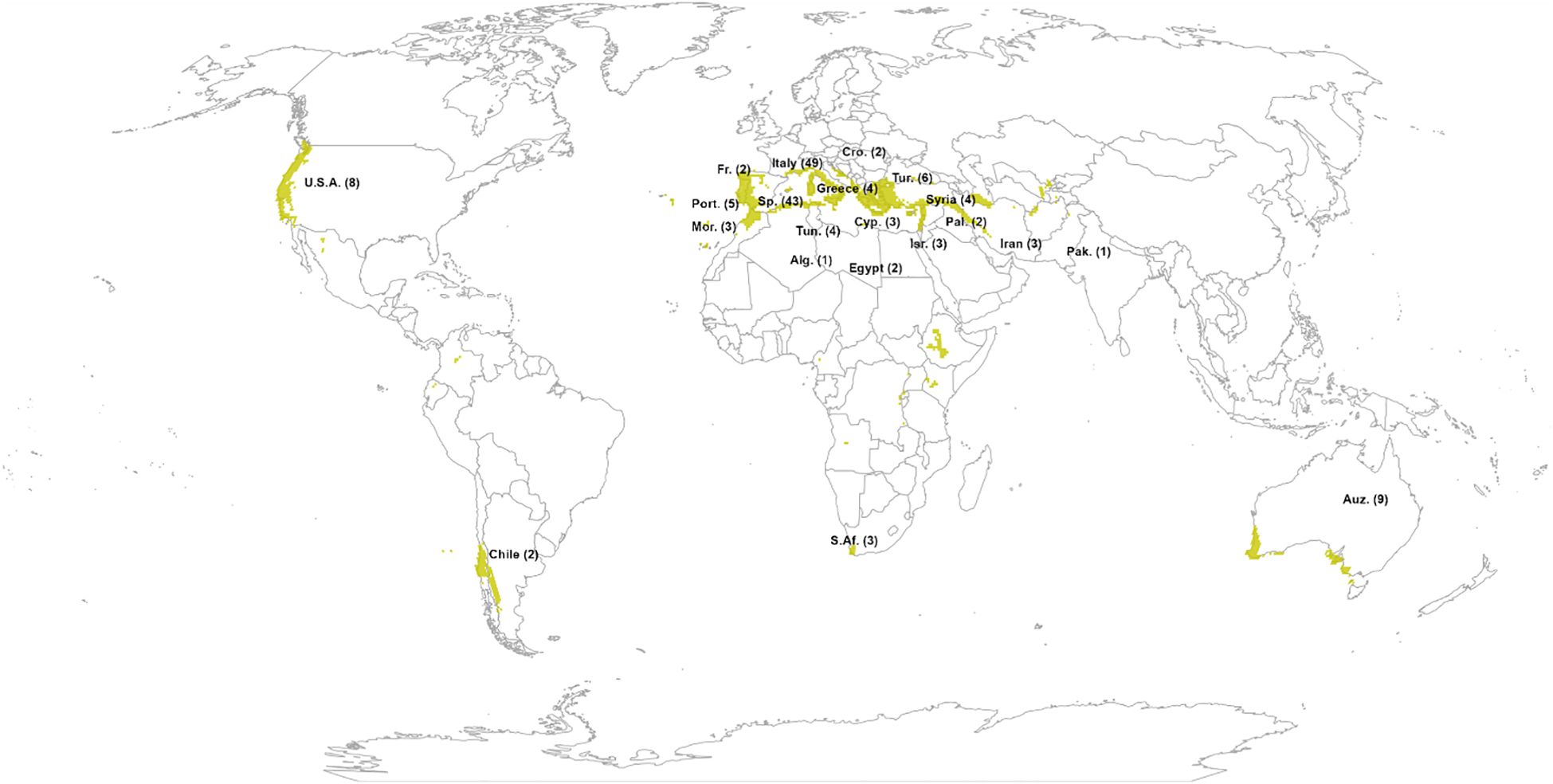
Figure 3. Countries where research was conducted: The locations shaded in yellow have Mediterranean-type climates and are mapped using Köppen-Geiger climate classification (Csa, Csb and Csc) data for the 1991 to 2020 time period (Beck et al., 2023). The data was not filtered to exclude any locations from the Köppen-Geiger data set, such as the areas in Ethiopia, Kenya Colombia and Ecuador that are not typically considered as countries with Mediterranean-type climates. The text depicts the countries, and the number of studies conducted in each country. Studies that did not state the location of the study (n=2). The abbreviations are Alg., Algeria; Auz., Australia; Cro., Croatia; Cyp., Cyprus; Fr., France; Isr., Israel; Mor., Morocco; Pak., Pakistan; Pal., Palestine; Port., Portugal; S.Af., South Africa; Sp., Spain; Tun., Tunisia; Tur., Turkey; U.S.A., United States of America. Chile, Egypt, Greece, Italy, Iran, Syria are not abbreviated.
The countries and territories that have Mediterranean-type climates that did not appear in the literature search include Albania, Bosnia and Herzegovina, Gibraltar, Malta, Montenegro, and Iraq. Not having representation in the literature search does not mean interventions are not being researched in these countries.
Crops studied
The field studies focused on 55 unique crops including cereal, fruit, grass, herbs and legume crops (see Table 1). The most studied crops were wheat (n=39), grape (n=16), tomato (n=14), barley (n=13), olive (n=13) and maize (n=11). The crops that were studied more than once are presented in Figure 4.
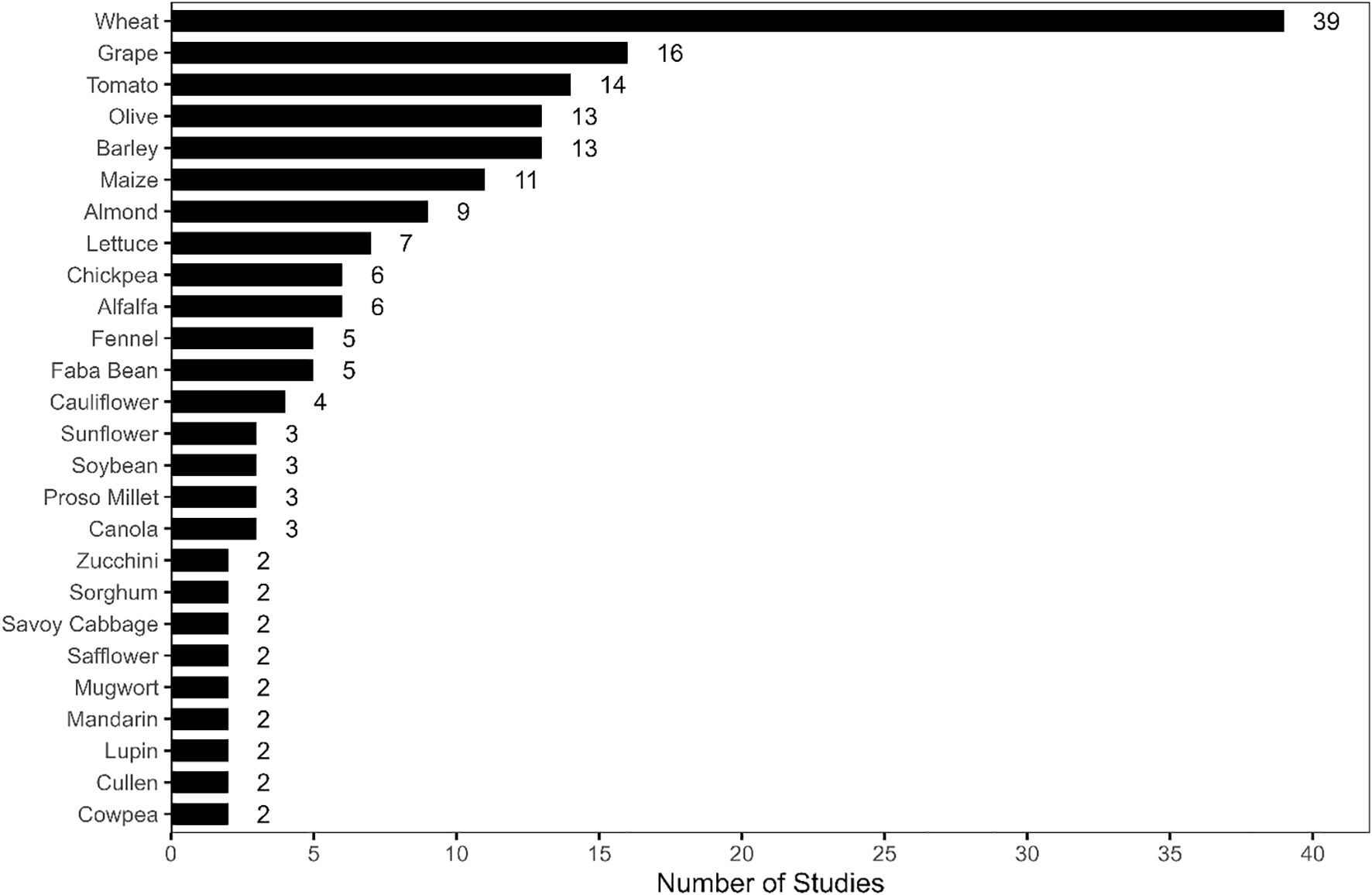
Figure 4. Main crop of focus in the studies ranked by frequency of occurrence in the literature. Other crops identified in the studies that occur only once are not included in the graph. These include apricot, artemisia, blueberry, camelina, cardoon, carob, carrot, clover, cocksfoot, French serradella, glass wort, grapefruit, lentil, moringa, mug wort, oat, orange, peach, peppers, pistachio, potato, quinoa, rapeseed, rooibos, ryegrass, saffron, St John’s wort, sulla, tall fescue, teff, triticale.
It is not surprising the crops most researched are high value crops. Crops that are understudied are the valuable cereal, fruit, vegetable and oil crops such as potato, oat, orange, mandarin, peach, apricot, peppers, and lettuce. The presence of crops that are drought resistant and adapted to the Mediterranean-type climate such as safflowers, cardoon, sunflower and canola are expected, but these are also under-studied.
Climate change aspects assessed
Type of climate change outcome linked to research: mitigation and/or adaptation
Interventions to manage agriculture can impact climate mitigation, climate adaptation or both. This is important to consider since there may be trade-offs or synergies to consider between mitigation and adaptation when assessing outcomes of agriculture management practices. The analysis of the literature (excluding meta-analyses) shows that 62% of the research studies only collected data on adaptation outcomes, 23% only collected data on climate mitigation, and 15% collected data on both climate adaptation and climate mitigation (Figures 5, 6). When analyzing the data at the country level, only the USA and Israel countries had more studies related to climate mitigation than climate adaptation, and 20 countries had studies that focused on adaptation (>50%). Overall, the median proportion of studies per country that factored in mitigation was 25%. Only Spain (n = 10) and Italy (n = 8) had more than one study that included both mitigation and adaptation. Other locations with both aspects of climate change considered, occurring once, were Greece, Syria, Morocco, Chile and Croatia.
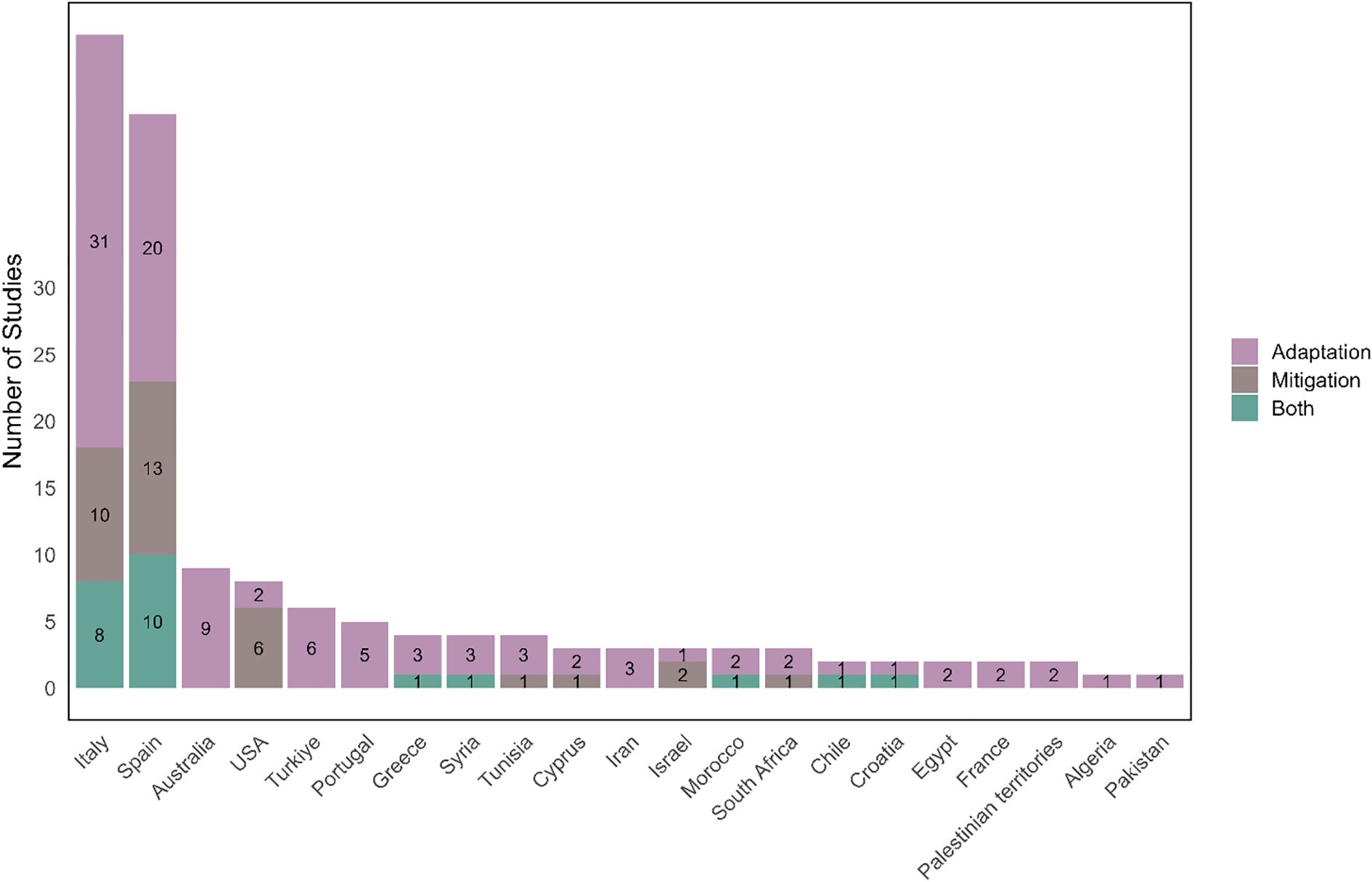
Figure 5. Number of studies per country contributing to research on climate interventions related to climate change mitigation, adaptation or both between 1996 and March 2025. Meta-analyses (n = 7) are excluded in this graph and 2 adaptation studies did not state their location.
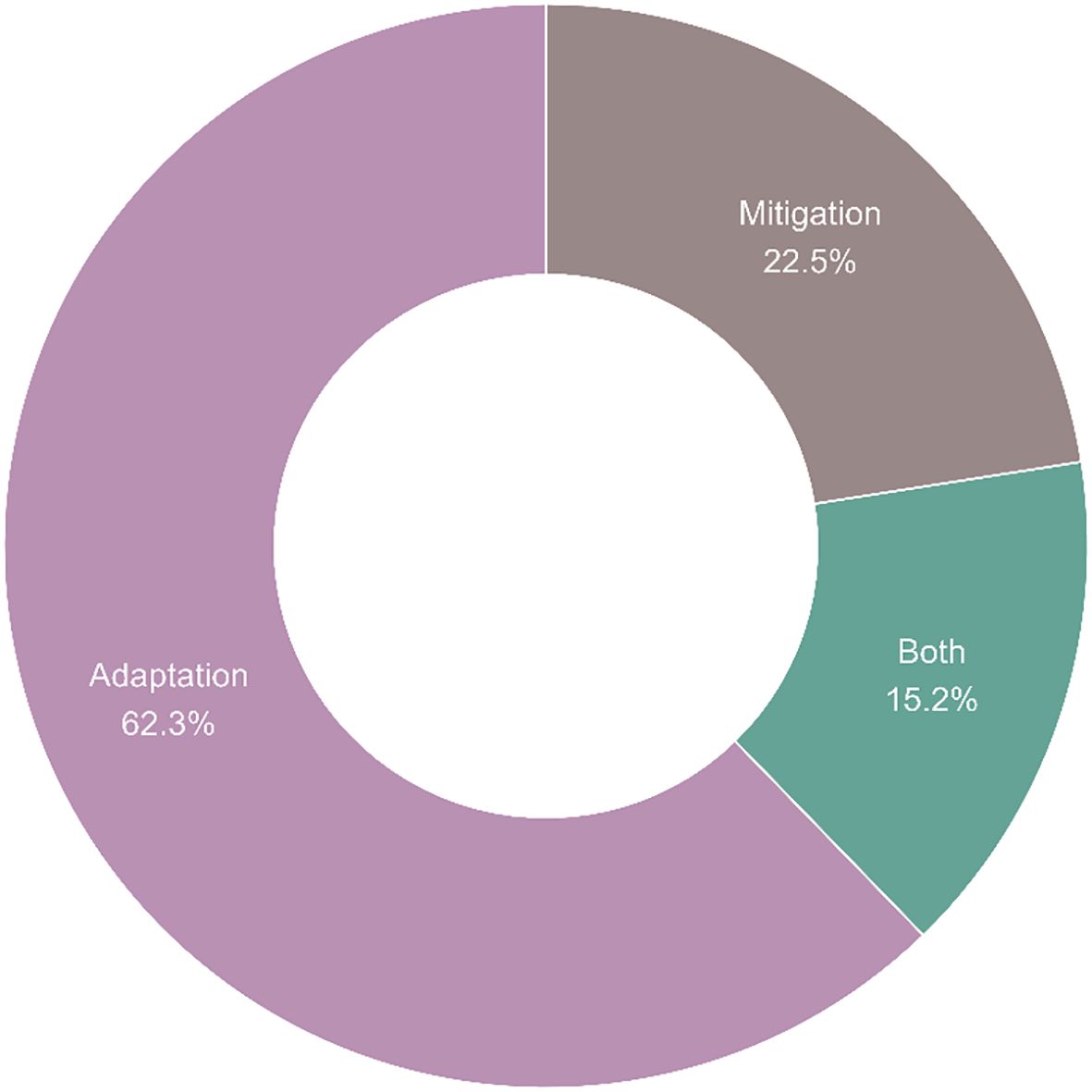
Figure 6. Typology of climate change research. The objectives of the studies either were applicable to only climate adaptation, only climate mitigation or both based on the researcher’s interpretation of the study.
Discursive framing of climate change
A basic scan of the articles was conducted to identify if they contextualized their research as pertaining to climate change mitigation, climate adaptation or neither. The abstract, introduction and discussion were scanned for reference to frame their work directly into climate change. Explicitly linking research to climate change will allow greater visibility for informing policy since readers will directly identify the policy relevance to climate change. For example, if research only frames the findings in terms of improving yield stability it may be interpreted as being specific to agrisciences. If it is framed to be in the context of climate resilience the study becomes more noticeable for the climate policy domain.
Most, but not all, authors linked their research directly to climate change. Of the total studies reviewed, 71% of the articles explicitly framed the context of the study to fall within climate change (Figure 7).
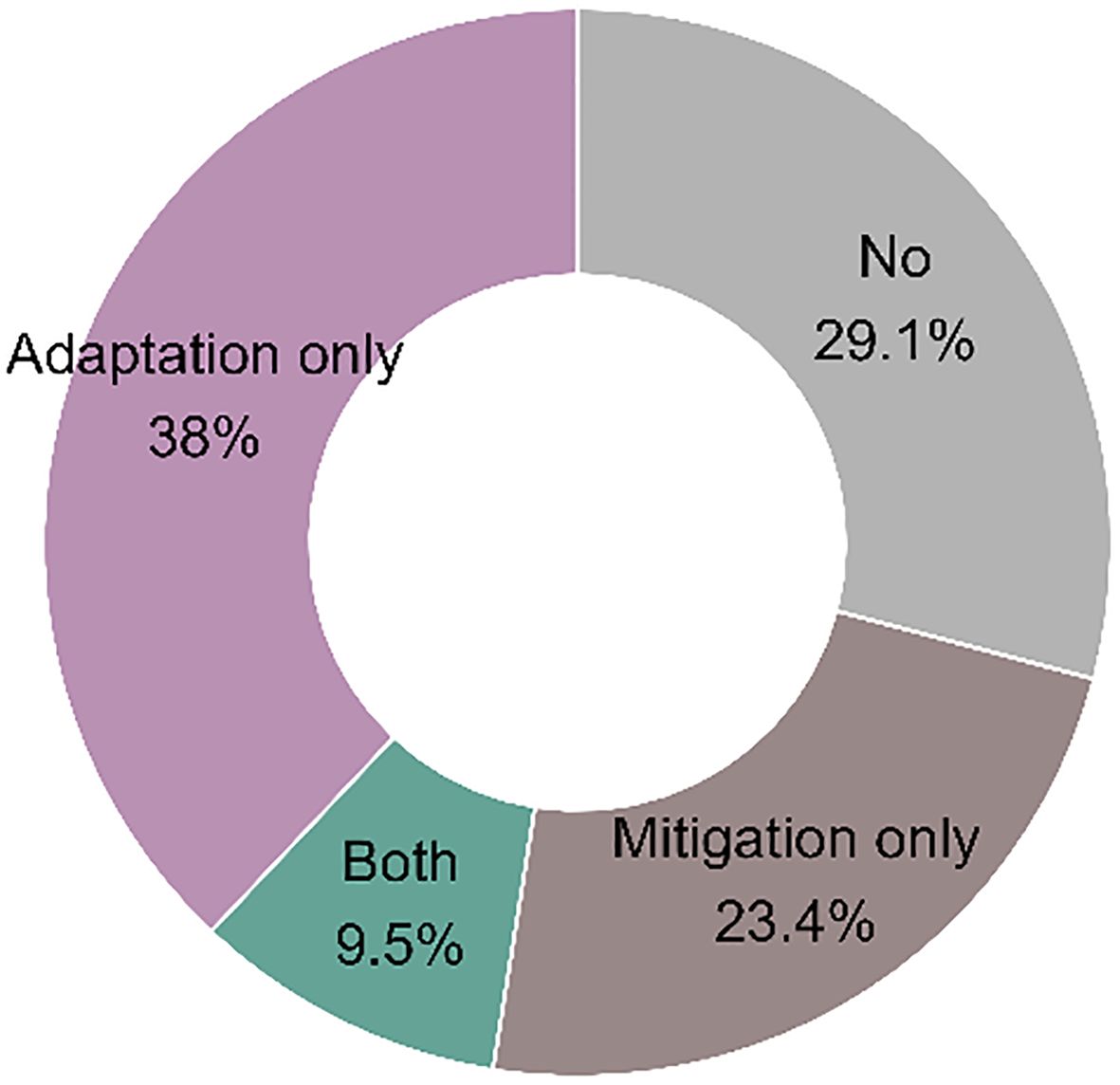
Figure 7. Research articles written with a framing of climate change. Consideration was made for direct linkages of climate change mitigation and or climate adaptation within the context of the background and introduction, discussion and conclusion sections.
Outcome of climate change mitigation studied
Climate mitigation outcomes included GHGs (CO2, CH4 and N2O) and carbon sequestration. Of the 62 studies that assessed climate change mitigation, the most frequent outcome studied was carbon sequestration either alone (n=29) or with any other combination (n=40), as illustrated in Figure 8. The least studied gas was methane (CH4), of which only six studies included this in an analysis with other GHGs and/or soil organic C. Only two studies conducted a comprehensive analysis by considering all the main GHGs and soil organic C in one publication. It is evident that research does not look at the net impact of interventions within climate mitigation. Such linkages do occur within climate mitigation, for example, research suggests that soil organic C can increase N2O emissions under certain conditions (Guenet et al., 2021). The evaluation of net climate mitigation is necessary to draw accurate conclusions about the impact of interventions on climate mitigation.
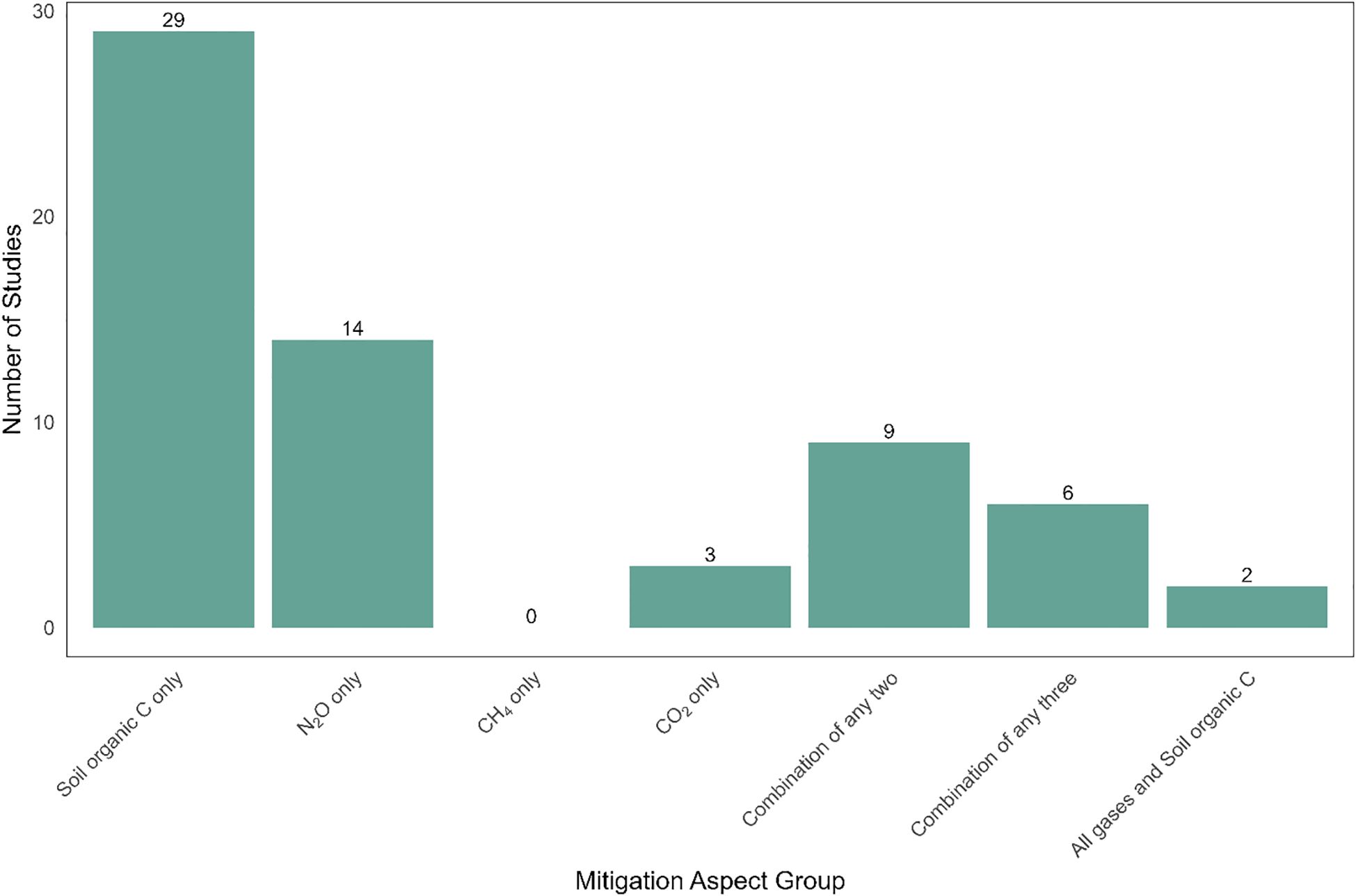
Figure 8. Outcome of climate change mitigation studied, considering greenhouse gases and carbon sequestration.
Outcome of climate change adaptation studied
This study broadly considered climate adaptation to include outcomes that contribute to improved agriculture production. Studies did not necessarily directly link their research focus to climate change and weather changes. The authors did not want to exclude research that enhances resilience of crop systems in times of shock.
The most frequent adaptation outcomes (>10) were improved yield, including yield stability, resilience to water stress (including drought and excessive rain), nutrient management, physical aspects of soil health, and quality of yield. It is not surprising that yield was the most studied adaptation outcome (n=53) since it is a key variable studied in agronomic research, of which this study falls within. Drought issues are a key concern in Mediterranean-type environments reflecting in the high frequency of this topic in the research (n = 45), Temperature stress (n=10), in particular, heat stress, adaptation to salinity (n=7) and acidic soils (n=3), also significant issues in semi-arid environments, are under-researched (Figure 9).
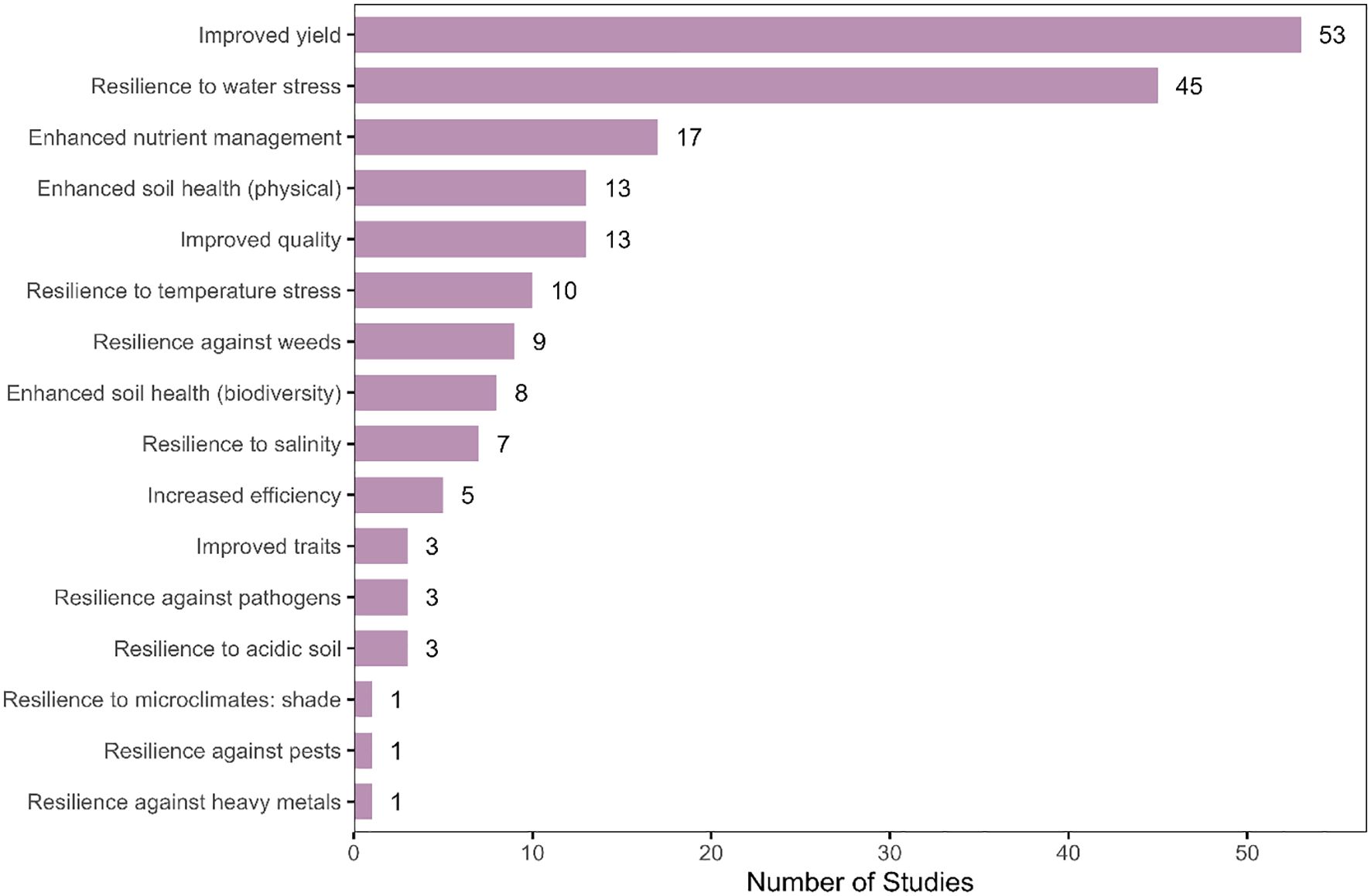
Figure 9. Adaptation outcomes studied. The outcomes are further defined in the Supplementary Material.
Scope of meta-analyses
Meta-analyses are helpful to review and analyze data across several studies around a specific research question. Seven studies are included in this review that look at multiple studies across the Mediterranean-type climate. These analyses are mostly relevant to climate mitigation (n=5) and included reviews of N2O emissions from cropping systems (Cayuela et al., 2017), N2O emissions affected by fertilizer type and water management (Aguilera et al., 2013b), impacts of cover crops (Aguilera et al., 2013a), the effects of conservation agriculture on soil organic C (Tadiello et al., 2023), carbon sequestration in olive, almond orchards and vineyards (Vicente-Vicente et al., 2016). Soil organic C is the most frequent mitigation outcome assessed (n=4), followed by N2O (n=2) and CO2 (n=1). Only two studies consider adaptation aspects including two reviews on cover crops (Ziche et al., 2024; Shackelford et al., 2019). Shackelford et al. (2019) included the adaptation outcomes of water stress, soil health in terms of biodiversity and weed management and Ziche et al. (2024) considered weed management and nutrient management.
Management interventions assessed
Agricultural management interventions are the variables studied in the research considered in this review that contribute to climate mitigation and/or climate adaptation. A total of 27 unique interventions were identified in the literature. These interventions were grouped into the agronomic management themes of crop establishment and harvesting, crop system management, soil management and water management. They were studied alone or in various combinations of two or more interventions within the same study. Overall, the five most frequent interventions researched include tillage management (n=51), organic fertilizer management (n=37), cover crops (n=35), chemical fertilizer management (n=23) and cultivar selection (n=22). The frequency of interventions is presented in Figure 10 and the relationship between interventions, crops and climate focus is illustrated in Figure 11.
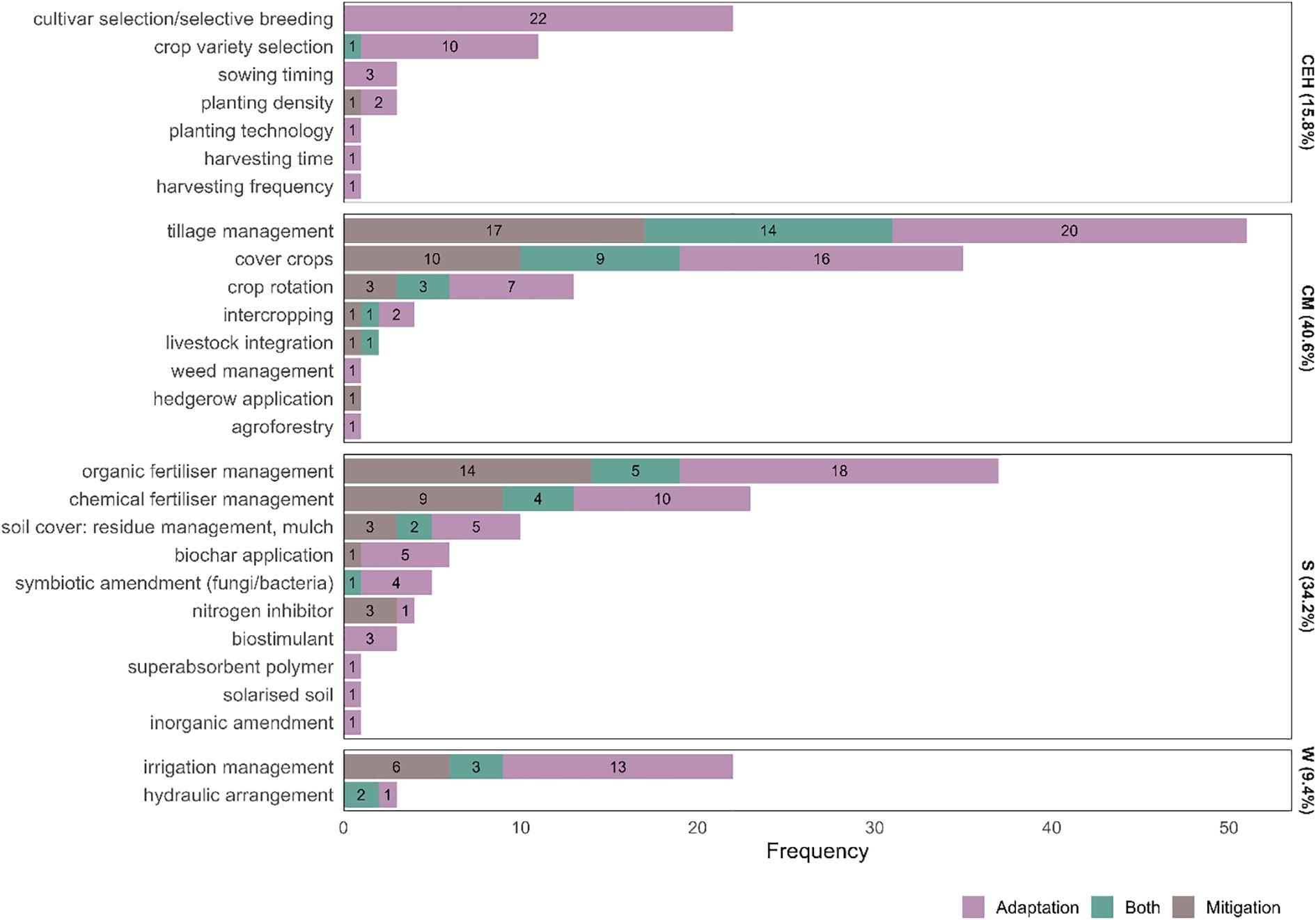
Figure 10. Frequency of interventions studied both in climate mitigation, climate adaptation and both. The interventions are grouped into water management (W), soil inputs (S), crop management system (CM), and crop establishment and harvesting (CEH).
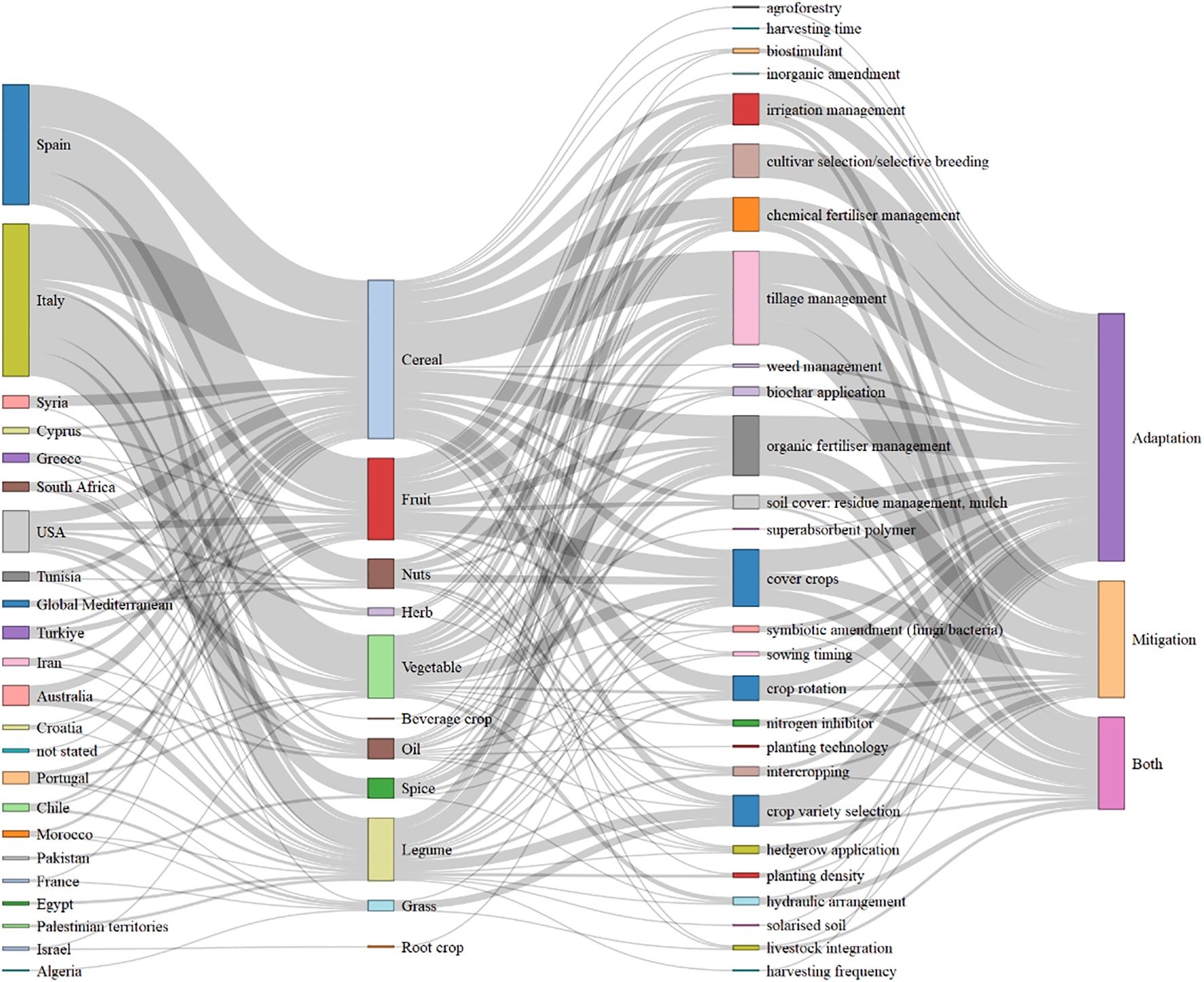
Figure 11. Sankey diagram of the research conducted thta includes the country, crop type, interventions studied and the relevance of the findings to mitigation, adaptation or both.
Climate change mitigation interventions
A total of 16 interventions were included in studies on GHGs and/or carbon sequestration. The major interventions (with a frequency >10) considered in climate mitigation studies include (most frequent): tillage management, organic fertilizer management, cover crops, and chemical fertilizer management. Other interventions include irrigation management, crop rotations, nitrogen inhibitors, soil cover, biochar application, intercropping, planting density, livestock integration, crop variety selection, symbiotic amendment (fungi/bacteria), hydraulic arrangement and application of hedgerows.
Climate change adaptation interventions
Climate adaptation studies included more interventions (n=26). The interventions with a frequency >10 include cultivar selection, tillage management, organic fertilizer management, cover crops, irrigation management, chemical fertilizer management and crop variety selection. Additional interventions included crop rotation, soil cover, biochar application, symbiotic amendments of fungi and/or bacteria, the application of biostimulant, sowing time, intercropping, planting density, nitrogen inhibitor, hydraulic arrangement, agroforestry, harvesting frequency, harvesting time, inorganic amendment, planting technology, solarized soil, application of superabsorbent polymer, and weed management.
Climate change mitigation and adaptation interventions
In studies that considered both mitigation and adaptation, a total of 12 interventions were studied. Tillage management, cover crops, organic fertilizer management and chemical fertilizer management were studied most frequently (frequency >3). Other interventions include organic fertiliser management, irrigation management, crop rotation, soil cover, hydraulic arrangements, crop variety selection, symbiotic amendments of fungi and/or bacteria, intercropping and livestock integration.
Limitations of the study
This review focused on searching for articles based on climate outcomes rather than searching based on specific interventions or locations. The limitation of this approach is the review may not have coverage of all research on possible agricultural interventions that contribute to climate mitigation or adaptation. It did not include research from all countries that have a Mediterranean-type climate including Albania, Bosnia and Herzegovina, Gibraltar, Malta, Montenegro, Liberia and Iraq.
The scope of this research was limited to climate change mitigation and adaptation intentionally excluding economic, social, cultural and other environmental aspects related to sustainable agriculture. It is recommended that future systematic mapping and systematic reviews are conducted to include these aspects and assess for benefits and trade-offs.
Implications for research and policy
A systematic map is an approach to assessing the state of knowledge in a particular research area. To our knowledge, this is the first study to compare research on agriculture management interventions and their contribution to climate responses of mitigation and adaptation. This study assessed the interventions studied, the locations of the research and the climate mitigation and adaptation outcomes, including detailed attributes of mitigation and adaptation. This systematic map may be helpful for both researchers and policy makers to guide their future research and, in the case of policy makers and research managers, where to direct research funding. An important finding for policy makers is that the evidence base is not enough to inform policy on what agriculture management interventions are suitable to optimise positive outcomes for both climate mitigation and adaptation, together with positive or acceptable yield outcomes. Only 1 of 158 considered impacts on yield, adaptation, and net mitigation.
This work highlights the importance of structured research programs to consider climate adaptation, mitigation, and aspects within climate mitigation and adaptation to be studied on various agronomic interventions and crops across regions with a Mediterranean-like climate. Synthetic research is needed across studies to assess co-benefits trade-offs that can inform policy. The research map available in the Supplementary Material can be further used as a resource for researchers to guide their research.
Conclusion
This systematic map highlights the limitations of the currently available scientific knowledge to inform a climate-smart approach to crop production in a Mediterranean-type climate. Research began in the late 1990s, with the first identified publication in 1998, increasing to 26 publications in 2024. Studies were identified in all the global regions with a Mediterranean-type climate, however, there is inadequate representation outside of Spain and Italy. The extent of the studies across geographic regions varied greatly from Italy (n=49) and Spain (n=43) having the most per country, 15 countries out of 21 having under five studies each and five countries having two studies or less. Management interventions were studied individually (n=27) or in various combinations across 55 different crops. Many of these crops were studied in less than three research events. The majority of the studies assessed the relationship with interventions with either adaptation (62%) or mitigation (22.5%), and only a few considered the impact of interventions on both (15%). Few studies considered the broader net impact on either adaptation or mitigation when investigating further the attributes that define climate mitigation (GHGs and carbon sequestration) or adaptation (resilience against extreme weather, water quality, salinity, nutrient availability and weeds). When considering the importance of applying climate adaptation and mitigation approaches to particular contexts of geographic locations, crops, interventions and combinations thereof, the research is significantly lacking.
It is also evident that little knowledge is known of the net climate effects of interventions regarding both climate adaptation and net climate mitigation. It is important to holistically assess the implementation of management interventions since there is the potential to increase resilience and climate mitigation, or an intervention synergistically may lead to trade-offs benefiting one aspect and contributing to climate forcing or climate maladaptation.
This article is framed by the authors in that, given the urgency to act on climate change, academic research in agriculture should be closely tied to policy. This will allow for the increased likelihood of tangible climate-smart actions will be applied to farms. The review found that not all studies explicitly linked the research to being relevant to climate change. 71% of articles framed the article as ‘climate change’, which may limit the visibility of research to practitioners.
A literature database was developed, and it is available as Supplementary Information for researchers to use in their future work.
Data availability statement
The original contributions presented in the study are included in the article/Supplementary Material. They can also be found in the github repository: https://github.com/27659526/Systematic-Map-of-Agronomic-Interventions-in-a-Mediterranean-Type-Climate.
Author contributions
KB: Conceptualization, Formal Analysis, Methodology, Writing – original draft. SM: Conceptualization, Funding acquisition, Resources, Supervision, Writing – review & editing. JS: Conceptualization, Funding acquisition, Resources, Supervision, Writing – review & editing. PS: Conceptualization, Funding acquisition, Resources, Supervision, Writing – review & editing.
Funding
The author(s) declare financial support was received for the research and/or publication of this article. The South African National Research Foundation has provided funding for this research (Grant number: CSRP2204264874).
Acknowledgments
The authors acknowledge the discussions with Elizabeth Moll-Willard to support the selection of search terms and methods used in this review.
Conflict of interest
The authors declare that the research was conducted in the absence of any commercial or financial relationships that could be construed as a potential conflict of interest.
Generative AI statement
The author(s) declare that Generative AI was used in the creation of this manuscript. Generative AI was used to assist with the generation of R coding to analyze the data sets and to create the figures.
Any alternative text (alt text) provided alongside figures in this article has been generated by Frontiers with the support of artificial intelligence and reasonable efforts have been made to ensure accuracy, including review by the authors wherever possible. If you identify any issues, please contact us.
Publisher’s note
All claims expressed in this article are solely those of the authors and do not necessarily represent those of their affiliated organizations, or those of the publisher, the editors and the reviewers. Any product that may be evaluated in this article, or claim that may be made by its manufacturer, is not guaranteed or endorsed by the publisher.
Supplementary material
The Supplementary Material for this article can be found online at: https://www.frontiersin.org/articles/10.3389/fagro.2025.1632146/full#supplementary-material
Supplementary Table 1 | Database of literature included in the systematic map and data attributes used in the analysis, citation, study objective, crop studied, study date, climate change aspect studied and finding and interventions studied.
Supplementary Table 2 | Definitions of adaptation outcomes.
Supplementary Table 3 | Definitions of interventions identified in the study.
Footnotes
- ^ The countries of Libya, Iran and Yemen have signed but not ratified the Paris Agreement.
References
Aguilera E., Díaz-Gaona C., García-Laureano R., Reyes-Palomo C., Guzmán G., Ortolani L., et al. (2020). Agroecology for adaptation to climate change and resource depletion in the Mediterranean region. A review. Agric. Systems. 181, 21. doi: 10.1016/j.agsy.2020.102809
Aguilera E., Lassaletta L., Gattinger A., and Gimeno B. S. (2013a). Managing soil carbon for climate change mitigation and adaptation in Mediterranean cropping systems: A meta-analysis. Agric. Ecosyst. Environment. 168, 25–36. doi: 10.1016/j.agee.2013.02.003
Aguilera E., Lassaletta L., Sanz-Cobena A., Garnier J., and Vallejo A. (2013b). The potential of organic fertilizers and water management to reduce N2O emissions in Mediterranean climate cropping systems. A review. Agriculture Ecosyst. Environment. 164, 32–52. doi: 10.1016/j.agee.2012.09.006
Aguilera E., Reyes-Palomo C., Díaz-Gaona C., Sanz-Cobena A., Smith P., García-Laureano R., et al. (2021). Greenhouse gas emissions from Mediterranean agriculture: Evidence of unbalanced research efforts and knowledge gaps. Global Environ. Change 69. doi: 10.1016/j.gloenvcha.2021.102319
Aleixandre-Benavent R., Aleixandre-Tudó J. L., Castelló-Cogollos L., and Aleixandre J. L. (2017). Trends in scientific research on climate change in agriculture and forestry subject areas, (2005–2014. J. Cleaner Production. 147, 406–418. doi: 10.1016/j.jclepro.2017.01.112
Beck H. E., McVicar T. R., Vergopolan N., Berg A., Lutsko N. J., Dufour A., et al. (2023). High-resolution (1 km) Köppen-Geiger maps for 1901–2099 based on constrained CMIP6 projections. Sci. Data 10. doi: 10.1038/s41597-023-02549-6
Beddington J. R., Asaduzzaman M., Clark M. E., and Bremauntz A. F. (2012). The role for scientists in tackling food insecurity and climate change. Agric. Food Secur. 1. doi: 10.1186/2048-7010-1-10
Cayuela M. L., Aguilera E., Sanz-Cobena A., Adams D. C., Abalos D., Barton L., et al. (2017). Direct nitrous oxide emissions in Mediterranean climate cropping systems: Emission factors based on a meta-analysis of available measurement data. Agric. Ecosyst. Environment. 238, 25–35. doi: 10.1016/j.agee.2016.10.006
Collins A. M., Haddaway N. R., Thomas J., Randall N. P., Taylor J. J., Berberi A., et al. (2022). Existing evidence on the impacts of within-field farmland management practices on the flux of greenhouse gases from arable cropland in temperate regions: a systematic map. Environ. Evidence. 11, 22. doi: 10.1186/s13750-022-00275-x
Donthu N., Kumar S., Mukherjee D., Pandey N., and Lim W. M. (2021). How to conduct a bibliometric analysis: An overview and guidelines. J. Business Res. 133, 285–296. doi: 10.1016/j.jbusres.2021.04.070
FAO, IFAD, UNICEF, WFP, and WHO (2024). The State of Food Security and Nutrition in the World 2024 – Financing to end hunger, food insecurity and malnutrition in all its forms. (Rome). doi: 10.4060/cd1254en
Guenet B., Gabrielle B., Chenu C., Arrouays D., Balesdent J., Bernoux M., et al. (2021). Can N2O emissions offset the benefits from soil organic carbon storage? Global Change Biol. 27, 237–256. doi: 10.1111/gcb.15342
IPCC (2023). “Summary for policymakers,” in Climate change 2023: synthesis report. Contribution of working groups I, II and III to the sixth assessment report of the intergovernmental panel on climate change (IPCC, Geneva, Switzerland), 1–34. CORE WRITING TEAM, H. L. A. J. R. E. doi: 10.59327/IPCC/AR6-9789291691647.001
James K. L., Randall N. P., and Haddaway N. R. (2016). A methodology for systematic mapping in environmental sciences. Environ. Evidence 5. doi: 10.1186/s13750-016-0059-6
Li C., Yao H., Li Z., Wu F., Liu B., Wu Y., et al. (2024). A bibliometric analysis of global research on climate change and agriculture from 1985 to 2023. Agronomy 14. doi: 10.3390/agronomy14112729
Lionello P., Abrantes F., Gacic M., Planton S., Trigo R., and Ulbrich U. (2014). The climate of the Mediterranean region: research progress and climate change impacts. Regional Environ. Change. 14, 1679–1684. doi: 10.1007/s10113-014-0666-0
Mrabet R., Savé R., Toreti A., Caiola N., Chentouf M., Llasat M., et al. (2020). Resources -food. First mediterranean assessment report (Marseille, France: UNEP/MAP). doi: 10.5281/zenodo.7101080
Page M. J., McKenzie J. E., Bossuyt P. M., Boutron I., Hoffmann T. C., Mulrow C. D., et al. (2021). The PRISMA 2020 statement: an updated guideline for reporting systematic reviews. BMJ 372, n71. doi: 10.1136/bmj.n71
Pius Awhari D., Jamal M. H. B., Muhammad M. K. I., and Shahid S. (2024). Bibliometric analysis of global climate change and agricultural production: Trends, gaps and future directions. Irrigation Drainage. 73, 1615–1632. doi: 10.1002/ird.2950
R Core Team (2021). R: A language and environment for statistical computing (Vienna, Austria: R Foundation for Statistical Computing). Available online at: https://www.r-project.org/index.html.
Roberts N., Meadows M. E., and Dodson J. R. (2001). The history of Mediterranean-type environments: climate culture and landscape. Holocene. 11, 631–634. doi: 10.1191/09596830195663
Román-Vázquez J., Carbonell-Bojollo R. M., Veroz-González Ó., Maraschi da Silva Piletti L. M., Márquez-García F., Cabeza-Ramírez L. J., et al. (2025). Global trends in conservation agriculture and climate change research: A bibliometric analysis. Agronomy 15. doi: 10.3390/agronomy15010249
Seager R., Osborn T. J., Kushnir Y., Simpson I. R., Nakamura J., and Liu H. (2019). Climate variability and change of mediterranean-type climates. J. Climate. 32, 2887–2915. doi: 10.1175/jcli-d-18-0472.1
Shackelford G. E., Kelsey R., and Dicks L. V. (2019). Effects of cover crops on multiple ecosystem services: Ten meta-analyses of data from arable farmland in California and the Mediterranean. Land Use Policy 88. doi: 10.1016/j.landusepol.2019.104204
Tadiello T., Acutis M., Perego A., Schillaci C., and Valkama E. (2023). Soil organic carbon under conservation agriculture in Mediterranean and humid subtropical climates: Global meta-analysis. Eur. J. Soil Sci. 74. doi: 10.1111/ejss.13338
Tricco A. C., Lillie E., Zarin W., O’Brien K. K., Colquhoun H., Levac D., et al. (2018). PRISMA extension for scoping reviews (PRISMA-scR): checklist and explanation. Ann. Internal Med. 169, 467–473. doi: 10.7326/m18-0850
United Nations (2015). Transforming our world: the 2030 agenda for sustainable development, A/RE/70/1.
United Nations (2025). United nations treaty collection: paris agreement. Available online at: https://treaties.un.org/pages/ViewDetails.aspx?src=TREATY&mtdsg_no=XXVII-7-d&chapter=27&clang=_en (Accessed April 16, 2025).
United Nations Framework Convention on Climate Change (UNFCCC) (2015). Paris agreement, FCCCC/CP/2015/L.9/Rev/1.
Urdiales-Flores D., Zittis G., Hadjinicolaou P., Osipov S., Klingmüller K., Mihalopoulos N., et al. (2023). Drivers of accelerated warming in Mediterranean climate-type regions. NPJ Climate Atmospheric Sci. 6. doi: 10.1038/s41612-023-00423-1
Vermeulen S. J., Campbell B. M., and Ingram J. S. I. (2012). Climate change and food systems. Annu. Rev. Environ. Resources. 37, 195–222. doi: 10.1146/annurev-environ-020411-130608
Vicente-Vicente J. L., García-Ruiz R., Francaviglia R., Aguilera E., and Smith P. (2016). Soil carbon sequestration rates under Mediterranean woody crops using recommended management practices: A meta-analysis. Agric. Ecosyst. Environment. 235, 204–214. doi: 10.1016/j.agee.2016.10.024
Keywords: field crops, climate-smart agriculture practices, climate adaptation, climate mitigation, sustainable agriculture, science-policy nexus, systematic map
Citation: Buchanan K, Midgley SJE, Strauss J and Swanepoel P (2025) Cultivating climate-smart crop systems: a systematic map of agronomic interventions in a Mediterranean-type climate. Front. Agron. 7:1632146. doi: 10.3389/fagro.2025.1632146
Received: 20 May 2025; Accepted: 18 August 2025;
Published: 12 September 2025.
Edited by:
Ioannis Roussis, Agricultural University of Athens, GreeceReviewed by:
Patrick Nyambo, Agricultural Research Council of South Africa (ARC-SA), South AfricaShi-Hong Zhang, Jilin University, China
Copyright © 2025 Buchanan, Midgley, Strauss and Swanepoel. This is an open-access article distributed under the terms of the Creative Commons Attribution License (CC BY). The use, distribution or reproduction in other forums is permitted, provided the original author(s) and the copyright owner(s) are credited and that the original publication in this journal is cited, in accordance with accepted academic practice. No use, distribution or reproduction is permitted which does not comply with these terms.
*Correspondence: Pieter Swanepoel, cGlldGVyc3dhbmVwb2VsQHN1bi5hYy56YQ==
 Kent Buchanan
Kent Buchanan Stephanie J.E. Midgley
Stephanie J.E. Midgley Johann Strauss
Johann Strauss Pieter Swanepoel
Pieter Swanepoel